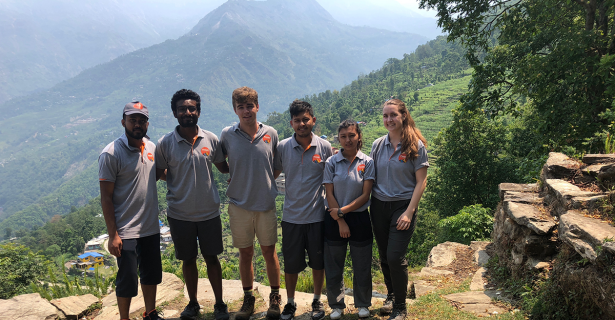After our 28-hour journey to Kathmandu, we arrived jet-lagged but excited to finally meet the PHASE staff that we have been in communication with over the past year. Though we might have lost some luggage at the airport and been overwhelmed by initial miscommunication with our transportation, the warmth of our generous homestay family quickly remedied all previous distress.
Bikash, a PHASE employee, arranged for us to stay with his brother-in-law, Sushil. Every morning, we woke up to the cacophonous sounds of buzzing street life and the bells ringing from Mom’s daily puja. Mom is Sushil’s mother, who only speaks Nepali, but is able to communicate with us through smiles and dramatic gestures. Most of our time spent with her is in the kitchen, where she prepares a rice-heavy meal with a side of vegetable-lentil curry. After our meals, we move to the living room area where Sushil and Bikash question us about American culture and teach us about their own. Whether we are discussing arranged marriages, the impact of the caste system (it even affects dating apps), or a shared love for Game of Thrones, it is an incredible experience to be immersed in Nepalese culture.
A fifteen-minute walk away from our homestay, the PHASE Nepal office is wedged between a bustling market and small gardens called Baris, encircled in the smog-ridden Kathmandu valley. Here, we met Rudra Neupane, the program director at PHASE, who introduced us to Manish (the research lead) and several public health students who we will be working closely with for the next three weeks.
Our first day of orientation consisted of learning about the endline impact assessment survey that we have been assigned to help conduct in the Sindhupolchok district. Previous projects’ surveys have discovered important correlations, such as the connection between fertilizer use and child nutritional wasting. Our survey will evaluate the results of PHASE’s livelihood interventions and assess the infrastructure of the government-run health posts.
We reviewed our survey methods and prepared for our nine-day stay in the rural Sindhupolchok.
One of our favorite conversations at the office was with Dr. Gerda Pohl — a founding member of PHASE Nepal and PHASE Worldwide. She kindly sat down and provided us with both a broad and detailed view of PHASE’s operations and contributions to the community. Dr. Pohl was instrumental in establishing the relationship between Tufts GlobeMed and PHASE Nepal. She spoke favorably about GlobeMed’s mission to avoid voluntourism by promoting long-term relationships with NGOs; what sets GlobeMed apart is that although we are a learning organization, we also help with fundraising that is crucial to their project operations.
We also had the privilege of speaking with a Rosie Westerveld, a PhD student from the University of Sheffield. Her proposed thesis centers on the relationship between international donors and local experts within the NGOs. She shed light on the complicated and oftentimes inequitable relationship between donors who set corporation-like restrictions on funding and on-the-ground experts, like Rudra, who ultimately understand their community’s needs best. Rosie explained that this becomes problematic when projects that truly need funding do not meet any of the conditions imposed by donors.
On Saturday, we had a free day to explore the cultural landmarks of Kathmandu. We met Saurav Gyawali, another Tufts sophomore, who graciously offered to help us navigate the chaotic and crowded streets. We visited Bhatahpur and Kathmandu Durbar Square, where we were able to view impressive medieval architecture, some of which is still recovering from the devastating 2015 earthquake. We were fortunate to visit Swyambhunath, also known as the monkey temple, during Buddha’s birthday. Atop the temple, we were able to get a beautiful view of the entire Kathmandu valley during all the local festivities. Nearby, we ate Nepal’s famous momos, a delicious dumpling-like dish.
We leave tomorrow for the Sindhupolchok district, where we are excited to engage in data collection work and experience the beautiful rural nature of eastern Nepal.

